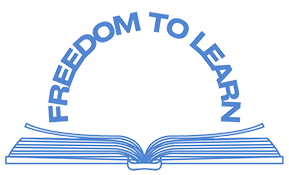TYPES OF ACTIVATIONS
Welcome to the Freedom to Learn Network! We are excited to engage in good trouble together. We want to emphasize that there are dozens, hundreds, maybe even thousands of actions you may be engaged in across the country. As such, the activations we set out below are only meant to spark your creative juices as you imagine all of the ways you and your community can engage on May 3rd.
We know that people come from various arenas where you want to take action or raise awareness. Whether that is in your local public school, your workplace, university, or academic discipline, we have eight suggested activation “plays” in our activation playbook.
Each of these activities will have the recommended minimum number of people to participate in each activity (in parentheses) to help you decide which one you may want to select for May 3rd. The eight activation “plays” will provide ideas, resources, and step-by-step instructions to ensure your chosen activity is a success. There will also be additional opportunities to participate in rallies and marches sponsored by larger organizations in select cities across the country that you can find under the “Events” calendar.
Protests/Rallies
Protests and Rallies are ideal for 25+ attendees for a smaller location/organization or 50+ attendees for larger “signature events” led by larger organizations. So many schools, towns, college campuses, and workplaces are being affected by these anti-woke attacks and are being used to showcase their protestors. Your community might want to raise awareness of a local school board decision, a statewide law or policy, or simply remind the world that we have strength in our numbers.
Teach-In
A Teach-in is ideal for 20+ attendees. Teach-ins originated back in the 1960s as an effective community organizing method that builds capacity for collaborative action through awareness and knowledge concerning social justice issues and participatory discussions that prepare communities to be advocates and change agents. This teach-in “in a box” template is designed to make holding a teach-in as easy as possible—just reserve a meeting space (online or in person) and add people.
Banned Book Read-A-thon
A Banned Book Read-A-thon is ideal for 12+ attendees. A Banned Book Read-A-thon is a literacy-based activation where multiple readers are recruited to read a selected banned book (or excerpt) aloud to a virtual or live audience. Banned Book Read-a-thons raise awareness about the unprecedented rise in book bans across the country, particularly targeting Black and LGBTQ+ authors and subjects.
Freedom Circle
Modeled on the Freedom Schools of the 1960s, a Freedom Circle is ideal for 6+ attendees. Freedom Schools set out to expose Black and marginalized communities to political education. The idea was that literacy had the power to facilitate a critical consciousness that would assist in the struggle for voting rights, access to appropriate public education, and freedom. Freedom Circles center contemporary banned books and literature in discussions of liberation, social justice, racial equity, civil and human rights.
Community Town Hall
Town halls are ideal for 30+ attendees and are focused on elevating stories and experiences through speaker testimonies. The format is designed to facilitate collective dialogue and shared analysis about pressing issues facing communities. They are a useful tool for communities interested in uplifting issues related to public education and pushing back against Stop Woke laws around the country.
Op-Ed/Blog Publications
Op-Eds and blog publications are an ideal activation for an individual. In this activation, participants will write an op-ed, generally 500-750 words in length, or shorter letters to the Editor or blog posts on issues of interest to you related to the current assault on truth, anti-racism, and multiracial democracy.
Social Media Campaign
Social media is essential to an advocacy campaign that allows anyone to engage on May 3rd by themselves or with others. A social media campaign is a coordinated effort to reinforce or assist with an organizational goal using one or more social media platforms. Campaigns differ from everyday social media efforts because of their increased focus, targeting and measurability. The social media activations may include promotion leading up to May 3rd, coverage of other activations that will happen on May 3rd, and separate activations on May 3rd itself.
Engaging Political/Educational Leaders
Engaging elected political leaders or educational leaders is ideal for one or more attendees. You and others can express your objections to book bans; anti-CRT/LGBTQ+ rhetoric; cutting funding to DEI programs; and educational gag orders. Contact your school board or elected representatives to state or national office or other decision-makers on our day of action through email, social media, phone calls, in-person events, and media letters to the editor.
Playbook
Sign up to receive a copy of the playbook
